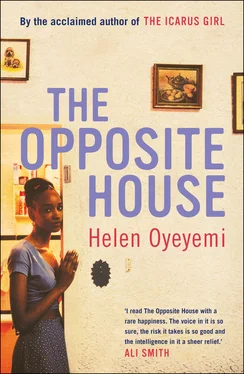Helen Oyeyemi - The Opposite House
Здесь есть возможность читать онлайн «Helen Oyeyemi - The Opposite House» весь текст электронной книги совершенно бесплатно (целиком полную версию без сокращений). В некоторых случаях можно слушать аудио, скачать через торрент в формате fb2 и присутствует краткое содержание. Год выпуска: 2008, Издательство: Bloomsbury UK, Жанр: Современная проза, на английском языке. Описание произведения, (предисловие) а так же отзывы посетителей доступны на портале библиотеки ЛибКат.
- Название:The Opposite House
- Автор:
- Издательство:Bloomsbury UK
- Жанр:
- Год:2008
- ISBN:нет данных
- Рейтинг книги:4 / 5. Голосов: 1
-
Избранное:Добавить в избранное
- Отзывы:
-
Ваша оценка:
- 80
- 1
- 2
- 3
- 4
- 5
The Opposite House: краткое содержание, описание и аннотация
Предлагаем к чтению аннотацию, описание, краткое содержание или предисловие (зависит от того, что написал сам автор книги «The Opposite House»). Если вы не нашли необходимую информацию о книге — напишите в комментариях, мы постараемся отыскать её.
The Opposite House — читать онлайн бесплатно полную книгу (весь текст) целиком
Ниже представлен текст книги, разбитый по страницам. Система сохранения места последней прочитанной страницы, позволяет с удобством читать онлайн бесплатно книгу «The Opposite House», без необходимости каждый раз заново искать на чём Вы остановились. Поставьте закладку, и сможете в любой момент перейти на страницу, на которой закончили чтение.
Интервал:
Закладка:
When her flowers burn, she stretches and sighs.
‘It still works,’ she says.
I watch the petals curl under the blaze that takes them to the centre of the bowl, and I don’t know what she had expected. Did she think that rice paper was no longer flammable? Take a prayer and put it in a photocopier, collect the copies and smile because you have more to go around, cry because when you lifted the lid of that machine, something blank and coarse fell out.
Chabella outstares her flames.
‘My father was kind to people because he didn’t expect them to be good, only interesting. And people are always that, no? If somebody stole from him, he didn’t mind as long as the thief was impeccably audacious. If someone lied to him, he didn’t mind as long as the lie was too wild to be believed, or too subtle to be suspected. Your abuelo , God rest his soul, was so tall that he couldn’t sit down on buses because there was really no room for his legs. But he was good about it; he stood up instead and lowered his head so that it didn’t slam against the bus roof, and he just smiled and watched people like a big bent hook in a paint-spattered T-shirt.
‘My father allowed me to throw tantrums and flounce and switch moods, and I never had to explain. When I announced that on Mondays I was going to eat only green things and on Tuesdays only brown things and on Wednesdays only yellow things, he said, “Fine, you must do what you feel,” even though my Mami frowned and said, “You are making her strange, you will let this girl run mad.” His girlfriends said to each other that he was spoiling me and that he would get no one to marry me. But he was just letting me contradict myself while I still could.
‘My father was almost perfect. The only thing wrong with him was that when he didn’t understand, he got angry. And he didn’t understand me because he stopped listening to me. I was the “feelings” child. Everything I did was a feeling, and it did not count. It is so difficult to talk about demons and gods and spirits without it seeming that you are mad, or sarcastic, or simple, or talking in pictures, or trying to confuse. Or trying to be interesting. It is difficult to talk about demons and make it understood that even if “spirit” is the best word available, it isn’t the right word.
‘Maja, let’s talk like mystics: let’s say I never had a mother. “I always ran home to Awe when a child, when anything befell me. He was an awful mother, but I liked him better than none.” Who wrote that?’
I stare at her. ‘Is this a quiz?’
She laughs at me. ‘No, querida , I only mean that I can’t remember who wrote it.’
I lay my head on my outstretched arms and Mami strokes my hair. Honey from her fingers webs behind my ears, but I don’t move. So what if my hair gets messed up; Mami has stayed still for worse. She told me that once, at a Santeria Mass, she sat with open eyes while rooster blood mapped her face.
Chabella was brave because she didn’t have a plan. She isn’t a storm or a leader or a king or a war or anything or anyone whose life and death makes noise. All she knew was that the words she loved were not all. There is skin, yes. And then, inside that, there is your language, the casual, inherited magic spells that make your skin real. It’s too late now — even if we could say ‘Shut up’ or ‘Where’s my dinner?’ in the first language, the real language, the words weren’t born in us. And unless your skin and your language touch each other without interruption, there is no word strong enough to make you understand that it matters that you live. The things that really say ‘stay’ are an Orisha, a kind night, a pretended boy, a garden song that made no sense. Those come closer to being enough.
12 The soul selects her own society
There is a leak in the hallway too; from a dim green patch the ceiling is crying a thin stream of tears. Miss Lassiter has said that she doesn’t know where the leak is coming from. Aaron, not being a plumber, has tapped her pipes, has said ‘Hm,’ has made a phone call. All we understand from what the plumber tells us is that this is an old house
(AARON: ‘Yes?’)
and that the repair is going to cost over five hundred pounds.
(AARON (jovial): ‘No! Come on, no no no.’)
He laughs pleasantly and tells the plumber that he’s going to get another quote. I say ‘Aaron, please , I need the leak stopped now, now,’ but Aaron is intractable. He doesn’t know that the leak is killing me. Haggling is fine in Accra, but he can’t do it to me — not here.
Someone knocks on the door, knocks so hard it booms. I twitch
(it is nothing to do with the door)
and that makes Aaron twitch. He checks the sitting-room clock and tells me, ‘It’s Amy Eleni’s boys.’ He rubs my arm, Don’t worry . He shouldn’t do that; my hysteric is the boring girl in the corner that you ignore — if you talk to her, she won’t shut up.
The boys crowd in, these are people’s sons. Their heads are close-shaven to expose peachy nicks on their scalps. They’re wearing Timberland boots and heavy-cut jeans that crash down to their toecaps. A uniform always prepares me for a crowd, so that at first I think there must be more than three of them. They look around, elbow each other, refuse my offer of tea, and crow, ‘This is boom digs! Sonic boooooom, know what I mean?’
Aaron introduces them as Kobe, Kweku and Kevin, his voice fitting smoothly around the Ewe names. Kevin shuffles his feet and wearily insists, as if continuing an argument that started before his birth, that it’s not his fault his parents gave him an English first name:
‘The teachers jump on it as soon as they see it in the register; they ignore “Akwasi”,’ he says. ‘I think they’re a bit relieved not to have to say it, really.’
Aaron manages to locate his coat, picks up his camcorder carry case and says a few words to them in confident Ewe. They look at him with flattered, embarrassed smiles and reply with accents less certain than his. Aaron’s accent, normally a quirk unique to him, now makes a skewed kind of sense. Somehow that hurts me; better for the accent to have stayed a quirk.
When Mass is ended and we have genuflected towards God, I tell Mami I’m going back to Habana. She is confused. She waves and smiles at other friends who are trickling out of the church, presses the Father’s hand, indicates that she can’t stop to talk today. She says, ‘Oh, but Maja, you can’t go.’
I touch Mami’s face, I ask, ‘Why not?’
‘Better talk to your Papi.’
Mami and I walk home holding each other’s hands tightly. Chabella is wearing big furry gloves, and I am not. Chabella insists that my hands are cold. I say no, but she keeps lifting my hands to her mouth to blow warmth onto my cracked palms.
Chabella says of Tomás, ‘Somehow he is just too tender. I know some will think that isn’t how a black boy should be. I am afraid that the other boys will punish him for it, his tenderness.’
I can’t find it in me to tell her not to worry. She should worry.
When Tomás was nine or so, I sometimes babysat him and his friend, Jon. At that time they were intense about conker wars. They waged their wars under the kitchen table, both lying flat on their stomachs, heads bowed towards each other as they struck each other’s forces in skirmishes and temporary sorties from behind fortresses, strategising with shrivelled conker soldiers. Tomás’s strategy was probably immaculate; all his work is, his diagrams and graphs and essays. But Jon won every game because it seemed that Tomás’s overall strategy was to let him win. Jon, his hair falling into his eyes, got frustrated with winning and swung with more force, harder and harder, his conker smashing against Tomás’s knuckles. But Tomás just winced and let him win and win.
Читать дальшеИнтервал:
Закладка:
Похожие книги на «The Opposite House»
Представляем Вашему вниманию похожие книги на «The Opposite House» списком для выбора. Мы отобрали схожую по названию и смыслу литературу в надежде предоставить читателям больше вариантов отыскать новые, интересные, ещё непрочитанные произведения.
Обсуждение, отзывы о книге «The Opposite House» и просто собственные мнения читателей. Оставьте ваши комментарии, напишите, что Вы думаете о произведении, его смысле или главных героях. Укажите что конкретно понравилось, а что нет, и почему Вы так считаете.












